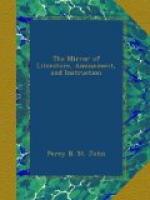“Are you the schoolmaster, my good friend?” inquired Stouber.
“Yes, sir.”
“And what do you teach the children?”
“Nothing, sir.”
“Nothing!—how is that?”
“Because,” replied the old man, with characteristic simplicity, “I know nothing myself.”
“Why, then, were you instituted schoolmaster?”
“Why, sir, I had been taking care of the Waldbach pigs for a great number of years, and when I got too old and infirm for that employment, they sent me here to take care of the children.”
* * * * *
PLANTING.
A custom prevailed in the neighbouring parts of Germany, where no farmer was allowed to marry till he had planted and was “father of a stated number of walnut trees, that law being inviolably observed,” says Evelyn, “for the extraordinary benefit which the trees afford the inhabitants.” What the Germans thus provided for by a wise law, Oberlin, a pious pastor of Waldbach, required as an act of religious duty, bringing that great principle into action on all occasions. Late in autumn he addressed his parishioners thus:—
“Dear Friends—Satan, the enemy of mankind, rejoices when we demolish and destroy; our Lord Jesus Christ, on the contrary, rejoices when we labour for the public good.
“You all desire to be saved by Him, and hope to become partakers of His glory. Please him, then, by every possible means, during the remainder of the time you may have to live in this world.
“He is pleased when, from the principle of love, you plant trees for the public benefit. Be willing, then to plant them. Plant them in the best possible manner. Remember, you do it to please Him.
“Put all your roads into good condition; ornament them; employ some of your trees for this purpose, and attend to their growth.”
* * * * *
EPITAPH.
In the churchyard at Waldbach was formerly a monument, which bore this epitaph:—
During three years of
marriage
Margaret Salome, wife of G. Stouber,
Minister of this parish,
Found at the Ban de la Roche, in the simplicity
of a peaceable
And useful life,
The delight of her benevolent heart;
and in her first confinement.
The grave of her youth and beauty,
She died, August 9, 1764, aged 20 years.
Near this spot
Her husband has sown for immortality all that was
mortal;
Uncertain whether he is more sensible of the
grief of having lost,
Or the glory of having possessed her.
* * * * *
MURDER OF THE LAIRD OF WARRISTON, BY HIS OWN WIFE.
This is the subject of a Scottish ballad, well known to collectors in that department; and the history of the conversion of the murderess, and of her carriage at her execution, compiled apparently by one of the clergymen of Edinburgh, has been lately printed by Mr. Charles Kirkpatrick Sharpe, whose merits as an author, antiquary, and draughtsman, stand in no need of our testimony.




